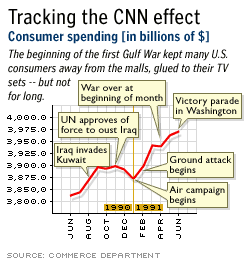NEW YORK (CNN/Money) -
When a U.S.-led war with Iraq begins, Americans will watch television, and a lot of it -- maybe even more than usual. While that might mean a temporary slump in consumer spending, most economists doubt it will be enough to swamp the broader economy.
In the days before a U.S.-led war with Iraq, which could start at almost any moment, much has been made of the so-called "CNN effect," a phrase coined during the first Gulf War, when Americans gathered 'round TV sets to watch the ghostly green images of a night-time air assault on Iraq.

According to Nielsen Media Research, which keeps track of TV-watching data, about 85.6 million viewers in 50.6 million U.S. homes -- about 54 percent of all homes with TVs -- tuned in to the first night of the Gulf War, making it one of the biggest TV-watching events in U.S. history.
In comparison, about 79.5 million people in 52.9 million homes -- roughly half of the TV-owning nation -- tuned in for networks' prime-time coverage on Sept. 11, 2001, the day of terrorist attacks that killed about 3,000 people and destroyed the World Trade Center in New York and damaged the Pentagon in Washington.
Neither Nielsen nor CNN would predict how many homes might tune in to the first night of the latest conflict, but it seems highly likely that, at least in the first days of the war, big numbers of people will be glued to their sets.
"There's going to be intense interest in viewership from now through weekend and maybe lasting a month or two," said Ken Goldstein, economist at the Conference Board, a private research firm that publishes a closely watched monthly survey of consumer confidence.
| Related stories
|

|
|
|
|
How consumers feel and what consumers do is critical to the U.S. economy, since their spending makes up more than two-thirds of gross domestic product (GDP), the broadest measure of the economy.
War fears, terrorism threats and a lousy job market have recently driven consumer confidence to lows not seen since the early 1990s, when the economy was struggling to recover from the 1990-91 recession.
And if the war makes consumers put spending plans on hold, even temporarily, that could be painful to many retailers who depend on a happy consumer for their survival, at a time when business hasn't been so good anyway.
"The weather played havoc with retailers in February, people have higher fuel bills and Easter's coming later than usual," said David Resler, chief economist at Nomura Securities. "The war's depressing effect on economic activity in March could be considerable. It wasn't shaping up to be a very good month anyway, and this could be the last straw."
Still, most economists think it's unlikely the "CNN effect" will be enough to tip the U.S. economy back into recession. After all, the average American already watches four hours of TV a day. If people spend that four hours watching war coverage instead of "Fear Factor," what's the difference?
And if the war goes well, Americans likely will turn their attention away from the conflict in short order, much as they did after the initial success of the American campaign to oust the Taliban from Afghanistan.
"It will temporarily depress some economic activity, in much the same way a snowstorm could," said Lakshman Achuthan, managing director of the Economic Cycle Research Institute, another private research firm, which predicts the dates of economic recessions and expansions.
"As long as there's not a permanent shift in behavior, we're going to go back to doing what we normally do," Achuthan said, "and we could end up making up for lost time, so we could get a bit of a bounce after that pause in spending."
Possibly the worst thing that could happen is that the temporary disruption of activity could throw a wrench in the crunching of economic numbers for the month, much as a big snowstorm skewed much of February's data.
In other words, Alan Greenspan, who was confused about the economy's health on Tuesday, might stay confused for a while.
But if the war goes badly -- a remote possibility, according to most analysts -- or if terrorists strike the United States, or if severe damage is done to the supply of oil from the Middle East, sending oil prices skyrocketing, then consumers likely will lose their appetite for shopping, and that would be very bad news for the economy.
"Right now, [our] leading indicators clearly show that the U.S. economy is in a window of vulnerability," Achuthan said. "This means that, depending on the course of oil prices and geopolitical events, the economy can be easily tipped into a new recession."

|

